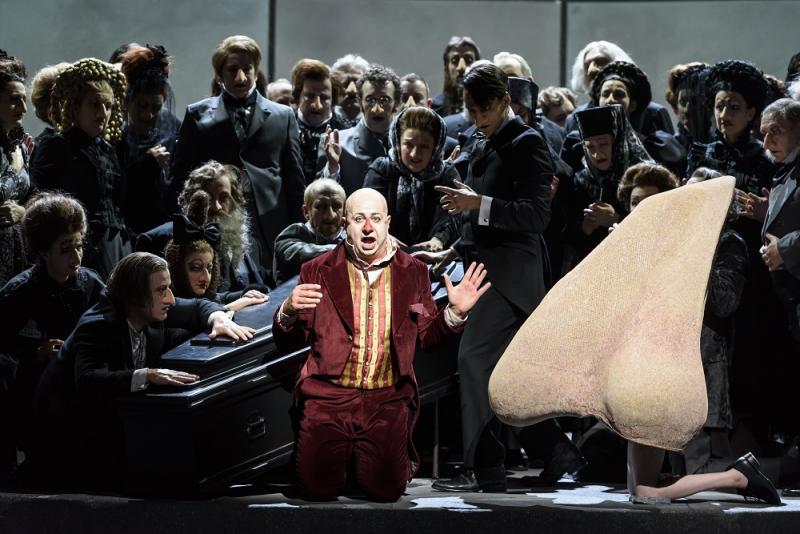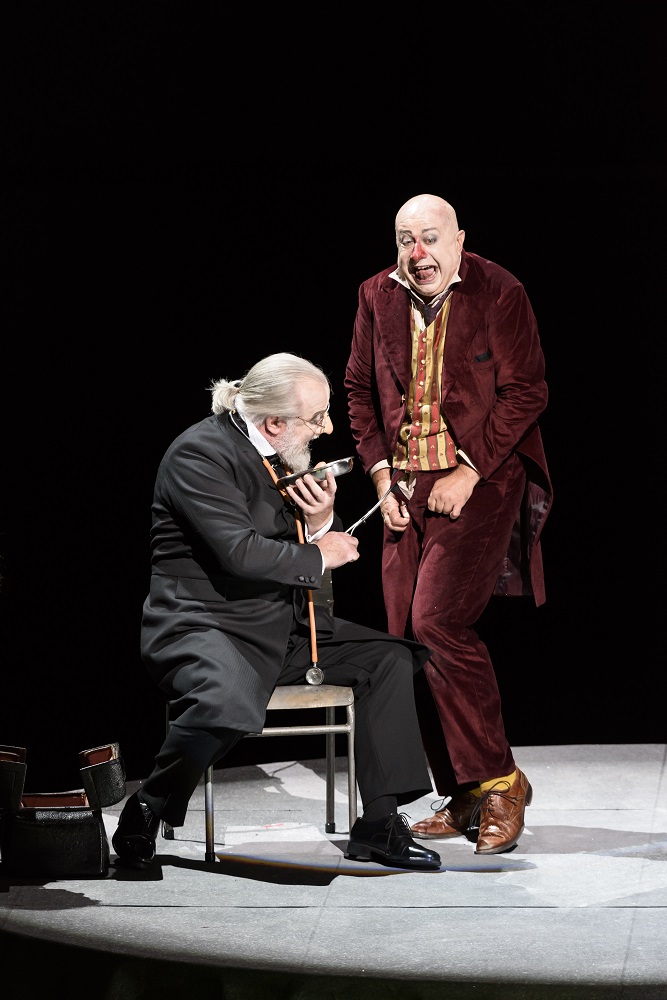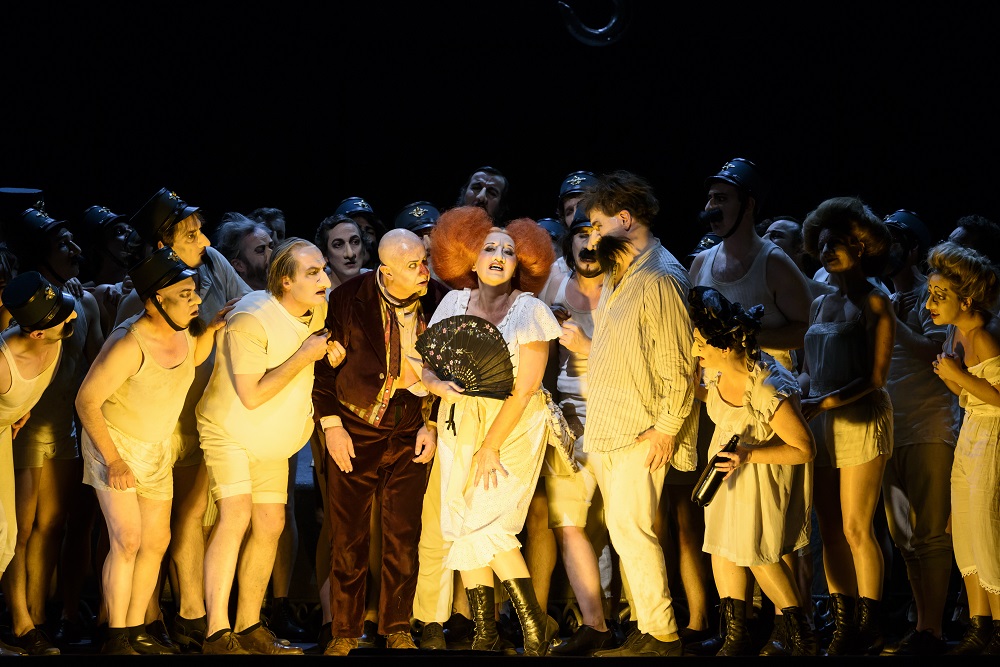The Nose, Royal Opera | reviews, news & interviews
The Nose, Royal Opera
The Nose, Royal Opera
Not quite as sharp as a pen, Kosky's Shostakovich has its funny moments

Even that most unpredictable of fantasists Nikolay Gogol might have been surprised to find his Nose, wandering far from the face of Collegiate Assessor Kovalyov, sung by a high tenor in an unlikely operatic adaptation of his wackiest story.
Take two crucial claims – one by the composer, one by this director – and it's not hard to see that Kosky might have gone a little wrong. True, it's the putative Shostakovich of Testimony, that much-disputed volume, who declares that "The Nose is a horror story, not a joke...Without a nose you are not a human being", but that rings true of a composer who was in one respect Gogol's musical double and understood him well.
 The horror isn't headlined here. Kovalyov is a puffed up and then deflated clown – highlighted by him taking on a red nose rather than a bandaged flat-face – but Shostakovich gives him music at times of pathos as well as of desperation. A characterisation to match was there when Moscow Chamber Orchestra's landmark production carried on doing the rounds in the 1990s. Here, though, none of this comes across in the way the excellent Martin Winkler (pictured right with John Tomlinson) is asked to play him: sung with some nuance certainly; grotesque, yes, and frenzied; but pitiable, no.
The horror isn't headlined here. Kovalyov is a puffed up and then deflated clown – highlighted by him taking on a red nose rather than a bandaged flat-face – but Shostakovich gives him music at times of pathos as well as of desperation. A characterisation to match was there when Moscow Chamber Orchestra's landmark production carried on doing the rounds in the 1990s. Here, though, none of this comes across in the way the excellent Martin Winkler (pictured right with John Tomlinson) is asked to play him: sung with some nuance certainly; grotesque, yes, and frenzied; but pitiable, no.
Then there's Kosky's assertion in a programme interview that "the piece is like an enormous locomotive that goes at a very fast pace". Frankly I've never found the work of a fitfully brilliant 20-year-old to work in that way; it could be shorter by a third and it probably needs a smaller scale production to move more nimbly. Yet by any standards several key scenes – above all the one where Kovalyov goes to a newpaper office to place an ad about his missing appendage – drag and pall. Not even Winkler and the ever-adaptable John Tomlinson can save that one. Ingo Metzmacher's conducting could certainly do with more definition at times, though he handles the crowd scenes well with strong participation from chorus and bit-part players. Even there Kosky departs from what's actually supposed to be happening and leaves us intermittently puzzled.

The highlight is choreographer Wolfgang Pichler's realisation of Kosky's vaudeville touches: Beryl Cook "ladies" in fur coats reveal Ann Summers underwear before executing to the extraordinary percussion-only interlude a kind of Verdi-Macbeth witches' invocation of the giant Nose (pictured above). It later multiplies – you could perhaps see it coming, but it's a brilliant interpolation all the same – into one interlude Shostakovich couldn't have envisaged, a tap-dancing number which is rightly a hit with the audience. Buki Shiff's exuberant costumes within the circles and on the round tables of Klaus Grünberg's set range from black and white, with an out-front chorus line surely indebted to images of Meyerhold's famous production of Gogol's Government Inspector, to dayglo colours, which save the last crowd scene from disintegration; a humiliated Kovalyov himself takes on the historical cameo of Persian prince Khozrev Mirza as a circus's star attraction.

The comic delivery comes and goes from the supporting cast, all sporting outsized noses. Peerless Wolfgang Ablinger-Sperrhacke as servant-catamite Ivan makes deliciously smarmy work of a song accompanied by balalaika-strumming Russian folk dolly and hams it up with licence. Susan Bickley puts across a nonsense scene as an old countess with panache (pictured above), and though the words of the other women can't always be heard, Rosie Aldridge does a very funny job of microphone-wielding compère trying to bring the show to a close with Gogol's own words before Kosky offers a final twist (or you could say a falling-off).
There are, of course, plenty of licences in David Pountney's translation. It was surely right for the Royal Opera to perform the work in English, as they had Prokofiev's The Gambler. I just wish the words fitted the music better (they're not as perfectly tailored in the original as Prokofiev's Musorgskyan speech-melody absolutely is, but there aren't quite so many false stresses). Who knows, given the audience response this one may run and run - there, a predictable Nose pun at last - but frankly its wit is not always of the sharpest and the momentary depths remain unplumbed. I only wonder what Richard Jones or Simon McBurney might have made of it.
rating
Explore topics
Share this article
The future of Arts Journalism
You can stop theartsdesk.com closing!
We urgently need financing to survive. Our fundraising drive has thus far raised £49,000 but we need to reach £100,000 or we will be forced to close. Please contribute here: https://gofund.me/c3f6033d
And if you can forward this information to anyone who might assist, we’d be grateful.

Subscribe to theartsdesk.com
Thank you for continuing to read our work on theartsdesk.com. For unlimited access to every article in its entirety, including our archive of more than 15,000 pieces, we're asking for £5 per month or £40 per year. We feel it's a very good deal, and hope you do too.
To take a subscription now simply click here.
And if you're looking for that extra gift for a friend or family member, why not treat them to a theartsdesk.com gift subscription?
more Opera
 Carmen, English National Opera review - not quite dangerous
Hopes for Niamh O’Sullivan only partly fulfilled, though much good singing throughout
Carmen, English National Opera review - not quite dangerous
Hopes for Niamh O’Sullivan only partly fulfilled, though much good singing throughout
 Giustino, Linbury Theatre review - a stylish account of a slight opera
Gods, mortals and monsters do battle in Handel's charming drama
Giustino, Linbury Theatre review - a stylish account of a slight opera
Gods, mortals and monsters do battle in Handel's charming drama
 Susanna, Opera North review - hybrid staging of a Handel oratorio
Dance and signing complement outstanding singing in a story of virtue rewarded
Susanna, Opera North review - hybrid staging of a Handel oratorio
Dance and signing complement outstanding singing in a story of virtue rewarded
 Ariodante, Opéra Garnier, Paris review - a blast of Baroque beauty
A near-perfect night at the opera
Ariodante, Opéra Garnier, Paris review - a blast of Baroque beauty
A near-perfect night at the opera
 Cinderella/La Cenerentola, English National Opera review - the truth behind the tinsel
Appealing performances cut through hyperactive stagecraft
Cinderella/La Cenerentola, English National Opera review - the truth behind the tinsel
Appealing performances cut through hyperactive stagecraft
 Tosca, Royal Opera review - Ailyn Pérez steps in as the most vivid of divas
Jakub Hrůša’s multicoloured Puccini last night found a soprano to match
Tosca, Royal Opera review - Ailyn Pérez steps in as the most vivid of divas
Jakub Hrůša’s multicoloured Puccini last night found a soprano to match
 Tosca, Welsh National Opera review - a great company reduced to brilliance
The old warhorse made special by the basics
Tosca, Welsh National Opera review - a great company reduced to brilliance
The old warhorse made special by the basics
 BBC Proms: The Marriage of Figaro, Glyndebourne Festival review - merriment and menace
Strong Proms transfer for a robust and affecting show
BBC Proms: The Marriage of Figaro, Glyndebourne Festival review - merriment and menace
Strong Proms transfer for a robust and affecting show
 BBC Proms: Suor Angelica, LSO, Pappano review - earthly passion, heavenly grief
A Sister to remember blesses Puccini's convent tragedy
BBC Proms: Suor Angelica, LSO, Pappano review - earthly passion, heavenly grief
A Sister to remember blesses Puccini's convent tragedy
 Orpheus and Eurydice, Opera Queensland/SCO, Edinburgh International Festival 2025 review - dazzling, but distracting
Eye-popping acrobatics don’t always assist in Gluck’s quest for operatic truth
Orpheus and Eurydice, Opera Queensland/SCO, Edinburgh International Festival 2025 review - dazzling, but distracting
Eye-popping acrobatics don’t always assist in Gluck’s quest for operatic truth
 MARS, Irish National Opera review - silly space oddity with fun stretches
Cast, orchestra and production give Jennifer Walshe’s bold collage their all
MARS, Irish National Opera review - silly space oddity with fun stretches
Cast, orchestra and production give Jennifer Walshe’s bold collage their all
 Káťa Kabanová, Glyndebourne review - emotional concentration in a salle modulable
Janáček superbly done through or in spite of the symbolism
Káťa Kabanová, Glyndebourne review - emotional concentration in a salle modulable
Janáček superbly done through or in spite of the symbolism

Add comment